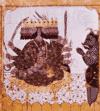- Ravana
-
/rah"veuh neuh/, n.(in the Ramayana) the king of Ceylon who abducts Sita, the wife of Ramachandra, and is later defeated by Ramachandra.
* * *
In Hinduism, king of the demons.Ravana is depicted with 10 heads and 20 hands and flying a magic chariot. He ruled in the kingdom of Lanka, from which he had expelled his brother Kubera. His abduction of Sita and defeat by her husband, Rama, are the central events of the epic Ramayana. The demon king is also remembered for shaking Mount Kailasa until Shiva intervened and imprisoned him beneath it for 1,000 years. The popular annual Ram Lila festival climaxes with the defeat of Ravana and the burning of huge effigies of demons. Rāvaṇa, the 10-headed demon-king, detail from a Guler painting of the ...Courtesy of the Cleveland Museum of Art, Ohio, gift of George P. Bickford
Rāvaṇa, the 10-headed demon-king, detail from a Guler painting of the ...Courtesy of the Cleveland Museum of Art, Ohio, gift of George P. Bickford* * *
▪ Hindu mythologyin Hindu mythology, the 10-headed king of the demons (rākṣasas). His abduction of Sītā and eventual defeat by her husband Rāma (Rama) are the central incidents of the popular epic the Rāmāyaṇa (“Romance of Rāma”). Rāvaṇa ruled in the kingdom of Laṅkā, believed by some to be modern Sri Lanka, from which he had expelled his brother Kubera. The Rām Līlā festival, an annual pageant popular particularly in northern India, is climaxed with the defeat of Rāvaṇa and the burning of huge effigies of the demons.Rāvaṇa is described as having 10 heads and 20 arms and is vividly portrayed in Rājasthānī painting of incidents of the Rāmāyaṇa, flying away with Sītā, fighting with Rāma, and sitting with his demon councillors. In sculpture, a favourite incident depicted is his shaking of Mount Kailāsa. Śiva (Shiva) (Shiva) stopped him by pressing the mountain down with his toe and kept him imprisoned beneath for 1,000 years. Notable examples of this representation can be seen at Ellora in Mahārāshtra state, India. Glorification of Rāvaṇa is not unknown. According to a minor tradition, the demons of Vishnu are successive reincarnations of his attendants, who take this form in order to be near him.In modern times, Tamil groups who oppose what they believe to be the political domination of southern India by the north view the story of Rāma as an example of the Aryan invasion of the south and express their sympathies for Rāvaṇa and against Rāma.* * *
Universalium. 2010.
